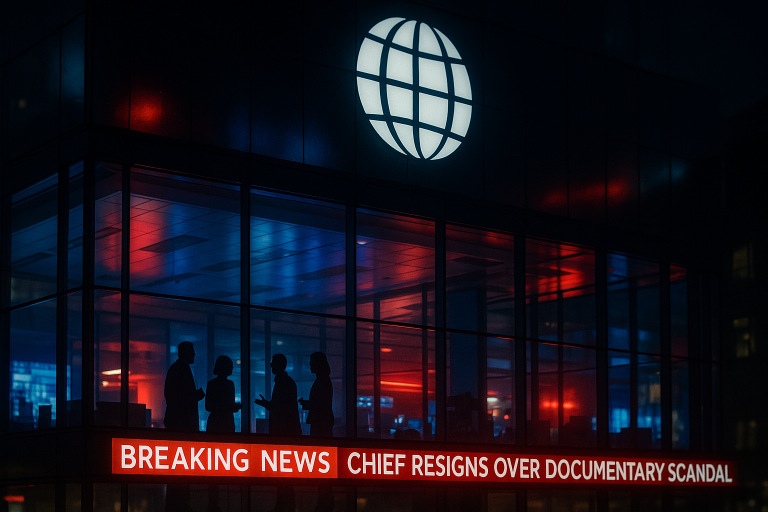The BBC faces unprecedented institutional crisis as director-general Tim Davie resigned Sunday following the explosive revelation that a flagship Panorama documentary misleadingly edited Donald Trump’s January 6 speech.
The development marks a dramatic downfall for the veteran broadcaster’s leadership after a tumultuous five-year tenure marked by sustained accusations of editorial bias.
News chief Deborah Turness also stepped down the same day, citing escalating damage to the organization.
The resignations ripple through British media and beyond as questions swirl around the future direction of the embattled public service institution.
The controversial documentary and the backlash
The storm around the BBC centers on its Panorama episode, “Trump: A Second Chance?”, which aired just before the 2024 US election.
According to internal BBC documents obtained by The Telegraph, the program apparently stitched together parts of Trump’s Capitol speech in a way that made it look like he was directly urging supporters to storm the building.
In reality, the full footage showed him using the phrase “fight like hell” more as a rallying metaphor, and crucially, the segment where he called for a ‘peaceful’ protest was cut from the version that aired.
A 19-page memo written by Michael Prescott, a former adviser to the BBC’s editorial standards committee, didn’t mince words. He called the edit “mangled” and accused the network of feeding viewers a “fundamentally false” narrative.
But the memo didn’t stop there. Prescott’s leak also pointed to what he described as deeper, systemic bias inside the BBC, from slanted Gaza coverage to the marginalization of gender-critical voices.
Together, these claims raised serious questions about the journalistic integrity of a broadcaster that reaches roughly 400 million people every week around the world.
In his resignation statement, Tim Davie admitted that “mistakes have been made” and said he takes “ultimate responsibility” as director-general.
Deborah Turness, who also stepped down, echoed the sentiment, saying the controversy had reached a point where it was actively “damaging the BBC.”
Still, she pushed back on the idea that BBC News itself was institutionally biased. Even so, the scale of the allegations suggested a much deeper credibility problem that ultimately forced both leaders out.
Trump’s victory lap and patterns of media pressure
Trump seized on the resignations as vindication.
On Truth Social, he declared victory over what he termed “corrupt journalists,” posting that BBC leadership quit because they were caught “doctoring” his “very good (PERFECT!)” speech.
White House Press Secretary Karoline Leavitt characterized the resignations as BBC News “dying” because it represents “Fake News,” framing the outcome as triumph over institutional dishonesty.
Trump’s reaction exemplifies a broader pattern of pressure on media organizations perceived as critical of his administration.
Since returning to office in January 2025, Trump has waged an unprecedented campaign against journalists and broadcasters, filing $15 billion in lawsuits against outlets like The New York Times and Wall Street Journal.
His administration has threatened to revoke broadcast licenses from networks including ABC, CBS, and NBC through FCC appointee Brendan Carr, an approach reminiscent of authoritarian governance models.
The suspension of Jimmy Kimmel’s show in September following critical commentary demonstrated Trump’s influence over media decisions.
Meta discontinued fact-checking partly due to Trump’s threats, while major media proprietors, including The Washington Post owner Jeff Bezos, have demonstrably adjusted editorial positions after regulatory pressure.
The BBC resignations thus fit an escalating pattern where Trump opponents in media leadership find their positions becoming untenable following organized pressure campaigns.
The organization faces an uncertain future as it seeks replacement leadership amid questions about editorial independence under contemporary political pressures.
The post Tim Davie resigns as BBC chief following backlash over Trump documentary appeared first on Invezz

